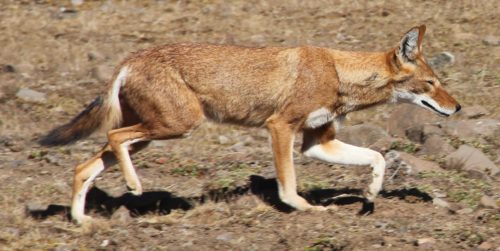Research published this week in the journal Vaccine reports field trials of the oral vaccine SAG2 in Ethiopian wolves, Africa’s most threatened carnivore and the world’s rarest canid.
The trials, undertaken by the University of Oxford, the Ethiopian Wildlife Conservation Authority and the UK Animal and Plant Health Agency in the Bale Mountains of Ethiopia, are the first ever conducted in wild populations of an endangered carnivore.
Researchers from Ethiopia and the UK tested various types of baits and ways to deliver the vaccine, trialling SAG2 in three wolf packs. Of 21 wolves trapped after vaccinations, 14 were positive for a biomarker indicating that the animal had ingested the bait; of these, half showed antibody titres in blood above the universally recognised threshold, and 86% had levels considered sufficient to provide protective immunity to wildlife. Wolves were closely monitored after the vaccination, and all but one of the wolves vaccinated were alive 14 months later (higher than average survival).
Oral vaccination proved to be the answer to controlling rabies in wild populations of red foxes and northern raccoons in Europe and North America, but the approach has never been tested in wild populations of endangered carnivores such as Ethiopian wolves and African wild dogs, which are at risk of extinction because of outbreaks of infectious diseases.
Rabies is a virus that kills people, domestic livestock and wild animals worldwide, and is particularly prevalent in the highlands of Ethiopia, where rabies recurrently jumps from domestic dogs into their wild relatives, the charismatic Ethiopian wolves. With fewer than 500 adult wolves left in half a dozen mountain ranges, and no captive populations, Ethiopian wolves are much rarer than giant pandas and unlikely to sustain the immediate and present threats rising from growing numbers of dogs and people living in and around their mountain enclaves.
But with wolves living in a sea of domestic dogs, in shrinking habitat islands, there is no time left to waste. Oral vaccination offers a more cost-efficient, safe and proactive approach to protect Ethiopian wolves and other threatened canids from rabies.
Lead author Professor Claudio Sillero-Zubiri, of the Wildlife Conservation Research Unit (WildCRU) in the Department of Zoology at the University of Oxford, said: ‘We now have a safe vaccine, a suitable bait, an efficient delivery method, and trained monitoring teams in place – all crucial steps which open up the possibility for scaling up the oral vaccination and protecting the wolf populations at risk, before disease strikes again.’
Head wolf monitor Alo Hussein, of the Ethiopian Wolf Conservation Programme (EWCP), said: ‘In spite of investing in excess of US$30,000 a year vaccinating thousands of domestic dogs, it has been impossible to attain a level of dog vaccinations that would remove the risk of wolves getting infected, due to the large and dynamic dog population in the Bale Mountains.’
Professor Tony Fooks, of the Institute of Infection and Global Health, University of Liverpool, and the Animal and Plant Health Agency, said: ‘These preliminary results using an oral vaccination strategy to protect Ethiopian wolves against rabies are encouraging and provide proof-of-principle for the use of this approach in wild canids.’
Dr Fekede Regassa, of the Ethiopian Wildlife Conservation Authority, said: ‘Since 1990, four major rabies outbreaks led each time to the crash of the Bale Mountains wolf population, the world’s largest, typically killing 50-75% of the subpopulation affected. EWCP vaccinates wolves reactively whenever a rabies outbreak is confirmed, contributing to contain the disease, but only after many wolves die – by the time rabies is detected, the virus is well established, and as wolves are highly social, it spreads fast.’


